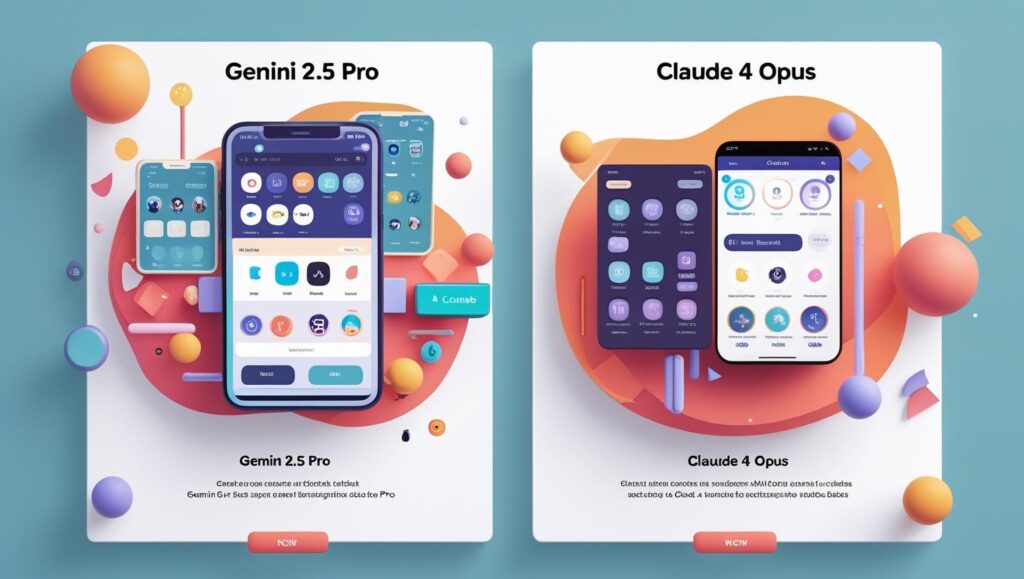Below is a detailed comparison of Gemini 2.5 Pro (Google) and Claude 4 Opus (Anthropic) across cost, performance, training data, use cases, and benchmarks, based on the latest available data. Key insights are synthesized from multiple sources, including technical reports, benchmark evaluations, and real-world tests.

1. Cost & Efficiency
| Metric | Gemini 2.5 Pro | Claude 4 Opus |
|---|---|---|
| Input Pricing | $2.50 / 1M tokens | $15 / 1M tokens |
| Output Pricing | $15 / 1M tokens | $75 / 1M tokens |
| Context Window | 1 million tokens (supports books, videos) | 200K tokens |
| Cost Efficiency | Better for large-document tasks | 50–90% savings with batch processing |
Key Insight: Gemini is significantly cheaper for input-heavy tasks (e.g., research), while Claude’s hybrid reasoning mode optimizes complex outputs but at a premium .
2. Performance & Benchmarks
Coding & Reasoning
- Claude 4 Opus:
- Leads SWE-bench (coding) at 72.5% (vs. Gemini’s 63.2%) .
- Dominates in real-world tests: Built functional 2D Mario, Tetris, and Chess games from scratch with clean, maintainable code .
- Superior agentic workflows: Runs 7-hour coding tasks autonomously (e.g., GitHub PR reviews) .
- Gemini 2.5 Pro:
- Excels in multimodal reasoning (images, audio, video), scoring 79.6% on MMMU (visual QA) .
- Faster token processing (180K tokens/75 sec) but produces less elegant code .
Math & Adaptive Reasoning
- Claude 4 Opus: 87.4% on MMLU (multitask accuracy) .
- Gemini: 83.3% on GPQA Diamond (Ph.D.-level science) .
- In adaptive tests (modified puzzles), both adapt well to new contexts, but Claude shows fewer training-data dependencies .
3. Training Data & Architecture
| Aspect | Gemini 2.5 Pro | Claude 4 Opus |
|---|---|---|
| Architecture | Mixture of Experts (MoE) Transformer | Constitutional AI (CAI) + RLHF |
| Training Focus | Multimodal integration (text, audio, video) | Safety, code quality, agent reliability |
| Key Innovations | “Deep Think” mode for parallel reasoning | Extended thinking + local memory files |
| Knowledge Cutoff | January 2025 | Mid-2025 |
Safety: Claude enforces strict constitutional principles at every layer, reducing “shortcut” behaviors by 65% .
4. Best Use Cases
| Task Type | Recommended Model | Why? |
|---|---|---|
| Large-codebase refactoring | Claude 4 Opus | Tracks context across files, edits surgically . |
| Multimodal analysis | Gemini 2.5 Pro | Processes 45-min videos/8-hr audio natively . |
| Research synthesis | Gemini 2.5 Pro | 1M-token context ingests books/legal docs . |
| Autonomous agents | Claude 4 Opus | Sustains performance over hours (e.g., marketing campaigns) . |
| Creative writing | Claude 4 Opus | Richer character depth; Gemini excels at strict word counts . |
5. Benchmark Summary
| Benchmark | Gemini 2.5 Pro | Claude 4 Opus | Key Insight |
|---|---|---|---|
| SWE-bench (Coding) | 63.2% | 72.5% | Claude leads in real-world coding tasks . |
| Terminal-bench | N/A | 43.2% | Claude excels in CLI-based workflows . |
| AIME 2025 (Math) | 83.0% | 75.5% | Gemini edges out in complex math . |
| GPQA Diamond | 83.3% | 83.3% | Tie in graduate-level science . |
| Hardest SAT Math | ~50% | ~90% | Claude Sonnet (not Opus) leads surprisingly . |
Conclusion: Which to Choose?
- Choose Claude 4 Opus if:
You prioritize coding precision, long-agent workflows, or safety-critical tasks (e.g., enterprise DevOps, autonomous agents). Its cost is justified for high-stakes outputs . - Choose Gemini 2.5 Pro if:
You need multimodal processing (video/audio), large-document analysis, or cost efficiency. Ideal for media analysis, research, and rapid prototyping .
💡 Real-World Tip: For budget-conscious coding, Claude 4 Sonnet (not Opus) offers 90% of Opus’s performance at 1/5 the cost, making it a pragmatic alternative .
